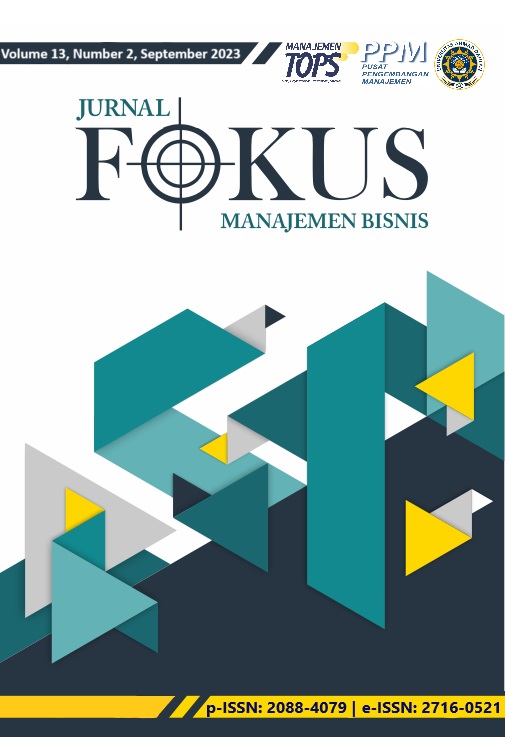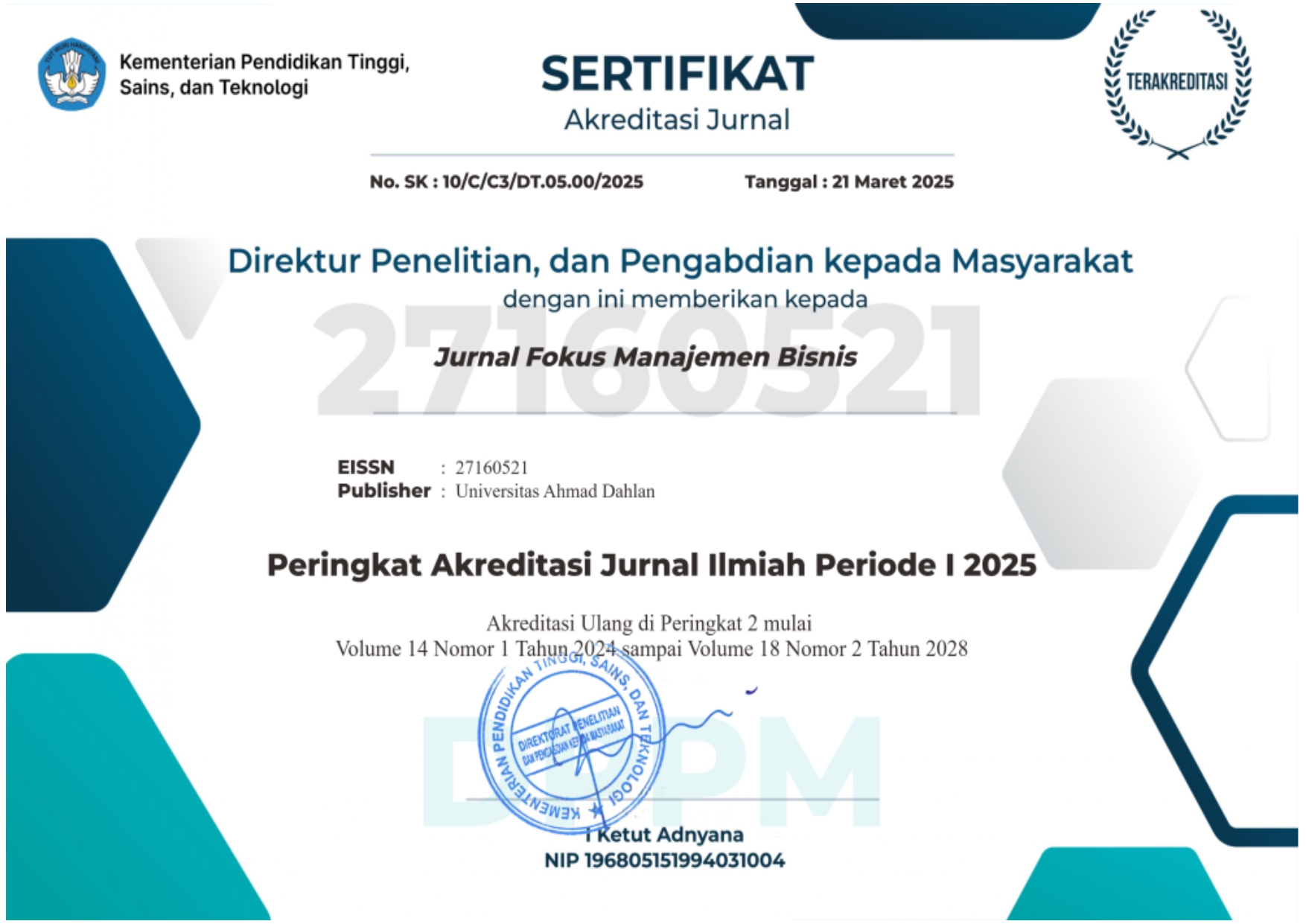Artificial intelligence and innovation practices: A conceptual inquiry
DOI:
https://doi.org/10.12928/fokus.v13i2.8847Abstract
Discourse on artificial intelligence runs noticeably along with the developments of computing technology. At the same time, the business environment become more uncertain, ambiguous, and competitive, which requires organizations to innovate for their sustainability continuously. This paper aims to broaden the body of knowledge on innovation management, particularly in relation to the application of artificial intelligence. The behavioural Theory of the Firm is used as a framework for writing this conceptual inquiry. To do so, artificial intelligence can assist organizations in processing information needed by companies to create incremental and radical innovations. Specifically, artificial intelligence is useful in overcoming barriers to innovation (during information processing and search processes) and in the process of generating and developing ideas and solutions. Furthermore, the process of adopting artificial intelligence in innovation management areas is determined by the level of organizational capability in information processing, which consists of three levels, namely exploitation, expansion, and exploration. Then, economic, technological and social forces are argued as factors that can push organizations to adopt artificial intelligence. At the same time, the challenges faced in the adoption process can come from technical aspects of technology, individual elements, and characteristics of interaction between technology and humans. The final part of this manuscript describes the future research agenda that can be carried out related to artificial intelligence and innovation management.
References
Agrawal, A., Gans, J., & Goldfarb, A. (2018). Prediction Machines: The Simple Economics of Artificial Intelligence. Harvard Business Press.
Amabile, T. M. (2020). Creativity, Artificial Intelligence, and A World of Surprises. Academy of Management Discoveries, 6(3). https://doi.org/10.5465/amd.2019.0075
Augier, M., & Prietula, M. (2007). Perspective: Historical Roots of the Behavioral Theory of the Firm Model at GSIA. Organization Science, 18(3), 507–522. https://doi.org/10.1287/orsc.1070.0276
Axten, N., Newell, A., & Simon, H. A. (1973). Human Problem Solving. Contemporary Sociology, 2(2). https://doi.org/10.2307/2063712
Bughin, J., Hazan, E., Ramaswamy, S., Chui, M., Allas, T., Dahlström, P., Henke, N., & Trench, M. (2017). Artificial Intelligence the Next Digital Frontier-Discussion Paper. McKinsey & Company.
Chui, M., Manyika, J., Miremadi, M., Henke, N., Chung, R., Nel, P., & Malhotra, S. (2018). Notes from the AI Frontier Insights From Hundreds of Use Cases. McKinsey Global Institute.
Cyert, R. M., & March, J. G. (1963). A Behavioral Theory of The Firm. Englewood Cliffs, 2(4), 169–187.
Denton, D. K. (1999). Gaining Competitiveness through Innovation. European Journal of Innovation Management, 2(2). https://doi.org/10.1108/14601069910269790
Eggers, J. P., & Kaplan, S. (2009). Cognition and Renewal: Comparing CEO and Organizational Effects on Incumbent Adaptation to Technical Change. Organization Science, 20(2). https://doi.org/10.1287/orsc.1080.0401
Haefner, N., Wincent, J., Parida, V., & Gassmann, O. (2021). Artificial Intelligence and Innovation Management: A Review, Framework, and Research Agenda. Technological Forecasting and Social Change, 162. https://doi.org/10.1016/j.techfore.2020.120392
Hajli, N., & Featherman, M. S. (2018). The Impact of New ICT Technologies and Its Applications on Health Service Development and Management. In Technological Forecasting and Social Change, 126. https://doi.org/10.1016/j.techfore.2017.09.015
Kaley, K. (2023). What is Artificial Intelligence? Types, History, and Future (2023 Edition). Simplilearn.
Kijkuit, B., & Van Den Ende, J. (2007). The Organizational Life of An Idea: Integrating Social Network, Creativity, and Decision-Making Perspectives. Journal of Management Studies, 44(6). https://doi.org/10.1111/j.1467-6486.2007.00695.x
Lenka, S., Parida, V., & Wincent, J. (2017). Digitalization Capabilities as Enablers of Value Co-Creation in Servitizing Firms. Psychology and Marketing, 34(1). https://doi.org/10.1002/mar.20975
Mariani, M. M., Machado, I., Magrelli, V., & Dwivedi, Y. K. (2023). Artificial Intelligence in Innovation Research: A Systematic Review, Conceptual Framework, and Future Research Directions. Technovation, 122. https://doi.org/10.1016/j.technovation.2022.102623
Martin, L., & Wilson, N. (2016). Opportunity, Discovery, and Creativity: A Critical Realist Perspective. International Small Business Journal: Researching Entrepreneurship, 34(3). https://doi.org/10.1177/0266242614551185
Purnomo, B. R., & Kristiansen, S. (2018). Economic Reasoning and Creative Industries Progress. Creative Industries Journal, 11(1). https://doi.org/10.1080/17510694.2017.1403206
Raisch, S., & Krakowski, S. (2021). Artificial Intelligence and Management: The Automation–Augmentation Paradox. Academy of Management Review, 46(1). https://doi.org/10.5465/AMR.2018.0072
Roose, K. (2019). The Hidden Automation Agenda of The Davos Elite. The New York Times, 25.
Simon, H. A. (2019). The Sciences of The Artificial, Reissue of The Third Edition with A New Introduction by John Laird. MIT Press.
Tarud, J. (2023). The Difference between Artificial Intelligence and Machine Learning. 2023.
Tidd, J. (2001). Innovation Management In Context: Environment, Organization and Performance. International Journal of Management Reviews, 3(3). https://doi.org/10.1111/1468-2370.00062
von Krogh, G. (2018). Artificial Intelligence in Organizations: New Opportunities for Phenomenon-Based Theorizing. Academy of Management Discoveries, 4(4). https://doi.org/10.5465/amd.2018.0084
Downloads
Published
How to Cite
Issue
Section
License
Copyright (c) 2023 Boyke Rudy Purnomo

This work is licensed under a Creative Commons Attribution-ShareAlike 4.0 International License.
Authors who publish with this journal agree to the following terms:Â
- Authors retain copyright and grant the journal right of first publication with the work simultaneously licensed under a Creative Commons Attribution License that allows others to share the work with an acknowledgment of the work's authorship and initial publication in this journal.
- Authors are able to enter into separate, additional contractual arrangements for the non-exclusive distribution of the journal's published version of the work (e.g., post it to an institutional repository or publish it in a book), with an acknowledgment of its initial publication in this journal.
- Authors are permitted and encouraged to post their work online (e.g., in institutional repositories or on their website) prior to and during the submission process, as it can lead to productive exchanges, as well as earlier and greater citation of published work (See The Effect of Open Access).







